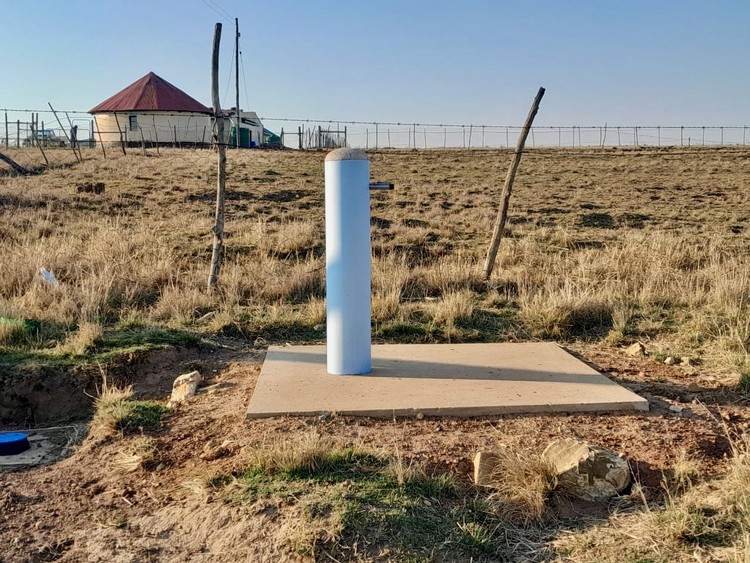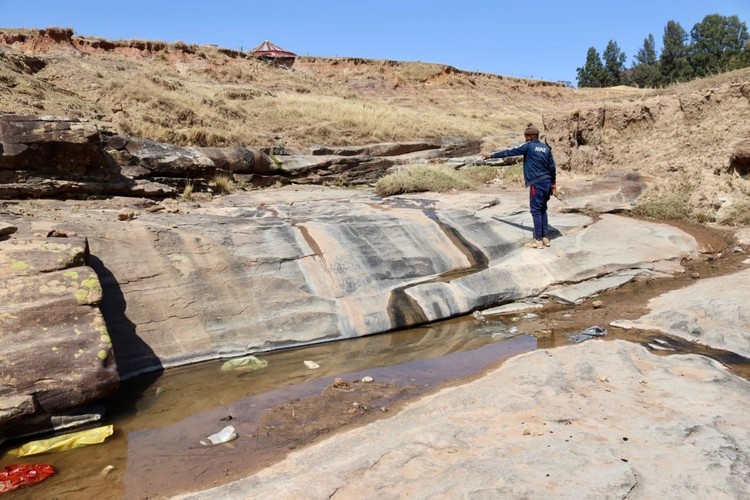R66-million spent on water schemes but these villagers’ taps are still dry
Yet water projects in Ngcobo are signed off as completed and successful
Taps have never had water in the Sundwana water project which started in October 2020. Photos: Manqulo Nyakombi
- The Chris Hani District Municipality has spent more than R66-million on four water projects and yet taps remain dry in villages in Ngcobo, Eastern Cape.
- Projects are signed off as having been “handed over” with “water coming out of the taps to our reasonable satisfaction”, when this is not the case.
- The leader of a delegation of the National Council of Provinces said they found that it was common practice for incomplete projects to be signed off as finished.
The Chris Hani District Municipality has spent more than R66-million on four water project. And yet the taps are dry in many villages in Ngcobo, Eastern Cape. Some have never had water. Others ran dry months or even years ago. Meanwhile, people share water with livestock at rivers.
Municipal spokesperson Bulelwa Ganyaza said seven water schemes have been built in the Ngcobo ward.
The R28.3-million phase 1 of the Lokshin project started in December 2015, was supposed to be completed a year later, but took until June 2020 to finish. It was meant to provide water to four areas in Lower Qebe and Lokshin village. A reservoir was built and taps installed.
Yet villages like Mthwazi, with 30 households, have only one tap and supply is intermittent. Villagers say the taps were dry for five months.
The R30.6-million phase 2, meant to be completed in May 2021, was finished in September 2023. Yet Lokshin villagers say in some sections taps have been dry for three years, while villagers in Hala say their taps have been dry since the day they were installed.
Ganyaza said the R1.5-million Sundwana water reticulation project started in October 2020 and was completed in April 2022. However contractors and consultants involved told GroundUp the project was only completed this year and still has issues that need to be rectified.
Even as residents complain about the lack of water, ward 13 Councillor Sivuyile Mfeki (ANC) and the ward committee chair signed forms back in July stating that taps had been “handed over” with “water coming out of the taps to our reasonable satisfaction”. Mfeki told GroundUp that the taps were tested and working fine when he signed.
Sundwana village sub-head Gcinisizwe Mbeshu believes the forms were signed to release funds to the contractors to finish the project. But the project remains unfinished.
Mbeshu said, “In some areas like mine the Upper Sitholeni taps were not installed, but we are told that the project is finished.” The standpipes are installed but without taps, he explained.
He said the ward committee chair who signed the form was “never part of the project steering committee”.
“Chris Hani [municipality] is telling us that testing was done and taps have water but not a single community member was called to witness that,” he said.
Steering committee chairperson Tsolwana Maqonga said he had refused to sign the forms as some villages had no taps.
Last month, a delegation of National Council of Provinces delegates led by Chief Mwelo Nonkonyana visited the province and “expressed their displeasure with the rising number of delayed infrastructure development projects”.
Nonkanyana told GroundUp that they had discovered that it was common for consent forms to be signed before a project is finished.
Ganyaza said that Lokshin one and two and Sundwana projects were to be supplied by the Sitholeni water treatment works, but it is not operational as it has no electricity. She said the Sitholeni community is demanding electrification of their households first.
Meanwhile Lokshin one and two are connected to a spring, but it takes long to fill the reservoir. A borehole has been sunk for the Sundwana villages and a contractor is currently constructing a pump house.
Another completed water project with dry taps is the R5.7-million Qutubeni scheme in the village where Walter Sisulu was born. The project started in September 2011 and was completed in June 2012. It is meant to supply spring water to villages including Mayirheni, Marheleni, Mqokoqho and Luhlalweni.
In Mayirheni village, taps were vandalised and stolen. The water supply is highly unreliable as it is the furtherest village from the springs and the last to receive water. Out of 30 taps installed in 2012, only two have water and then only after it rains.
Ntombizine Latshane, Quthubeni community chairperson, said the municipality has been promising for nearly a year that it will send a contractor to fix the water supply. She said they have a rotational system with each village getting water for three days after every six days. The water is from a spring that supplies a reservoir that supplies three taps installed in Latshane’s village in 1994.
Ganyaza said the area is badly affected by illegal connections.
A stream where Quthubeni residents gets water to drink and do their washing.
Support independent journalism
Donate using Payfast

Next: Next week’s budget: posts for teachers in the spotlight
Previous: Only one bridge links KwaNobuhle to Kariega after floods
© 2024 GroundUp. This article is licensed under a Creative Commons Attribution-NoDerivatives 4.0 International License.
You may republish this article, so long as you credit the authors and GroundUp, and do not change the text. Please include a link back to the original article.
We put an invisible pixel in the article so that we can count traffic to republishers. All analytics tools are solely on our servers. We do not give our logs to any third party. Logs are deleted after two weeks. We do not use any IP address identifying information except to count regional traffic. We are solely interested in counting hits, not tracking users. If you republish, please do not delete the invisible pixel.


